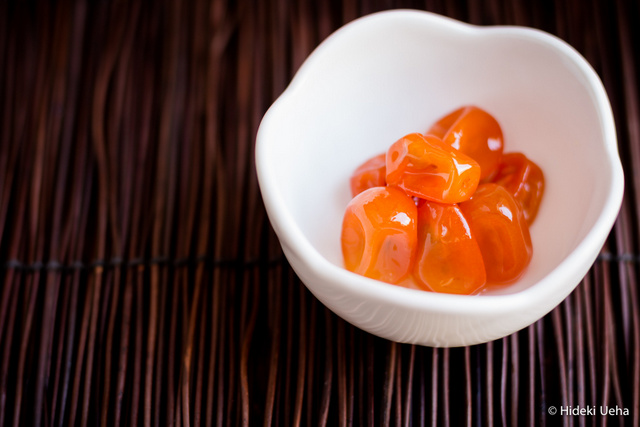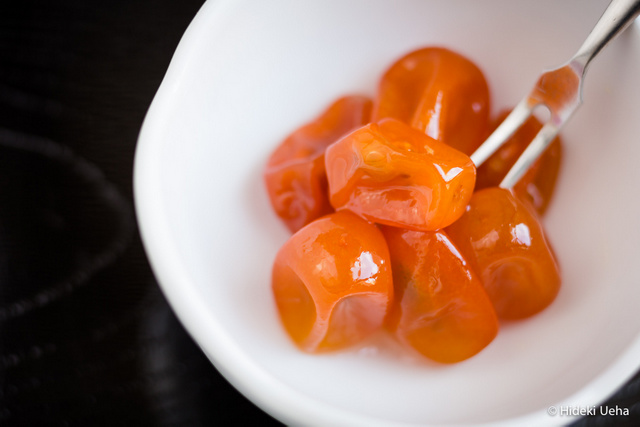Kinkan Kanro-Ni (Candied Kumquats)
For as long as I can remember, my Mom used to keep a re-used glass jam jar filled with little orange candied kumquats or kinkan kanro-ni in the back of our refrigerator. It never looked appealing to me, and as a child, I recall trying several of these kinkan kanro-ni over the years, but I never found the sweet, sour, and slightly bitter flavor of the candied kumquats to my liking. (Photo Credit: Hideki Ueha)
As I got older, the little glass jar of kinkan kanro-ni continued to reside in the back of my parent’s refrigerator. My Mom would eat these when she had a sore throat and would encourage me to try one anytime I was sick or complained of a sore throat. Reluctantly, I would eat one or two a year, but I would always do so with a sour face.
As the years went on, I suddenly noticed that the back of my own fridge seemed rather empty without that little glass jar filled with candied kumquats.

Photo Credit: Hideki Ueha
The funny thing about that jar of kinkan kanro-ni in my Mom’s fridge, is that it was never something that she made herself. She and her friends are constantly trading foods that they’ve cooked, and as it turns out, every year she would be the recipient of kinkan kanro-ni that one of her friends made. She can tell you which of her friends have kumquat trees and which of them don’t, among other vegetation such a who grows sakura or cherry blossom trees, shiso (perilla) leaves, rakkyo, and myoga.
When I asked my Mom if she had a recipe for kinkan kanro-ni, she said she didn’t have one since she’s never made it, but in addition, she gave me her usual no-recipe response in Japanese, “just add a little sugar, water, then boil it for a while”. So that’s exactly what I did, but with the addition of a splash of sake. When I asked her about removing the seeds from the kumquats (which is what I’ve done in the past when making marmalade), she said I could cook them with the seeds in tact and that they were edible. She said the kinkan kanro-ni that she’d always received and enjoyed always had the seeds in tact.
Despite the lack of a specific recipe, on the bright side, I am fortunate to have an abundant supply of very fresh organic kumquats easily within my reach. My in-laws have an enormous kumquat tree in their backyard which grows bountiful kumquats year after year.
In the past, I’ve made kumquat and cara cara orange marmalade, and then used this marmalade to make shortbread thumbprint cookies. This year, I decided to make candied kumquats or kinkan kanro-ni, and put them in a little jar in the back of my fridge.
Photo Credit: Hideki Ueha
Although I didn’t care much for kinkan kanro-ni as a child, I’ve grown to appreciate these little sweet and sour beauties as an adult. Like many of the foods I am fond of, this one brings back good memories of my childhood, albeit with a sour face.
Thanks to my little Bebe E and Nene for helping to pick these lovely kumquats from Yin Yin and Papa’s tree. And once again, thanks to my talented brother-in-law, Hideki, for the beautiful pictures in today’s post!
Cheers,
Judy
- 4 cups fresh kumquats, whole (optional: seeds removed)
- 1½ cups sugar
- 1½ cups water
- 1 tablespoon sake
- In a medium pot bring water to a boil, then add sugar and kumquats. Reduce heat to medium and simmer kumquats for about 20 minutes. NOTE: The kumquats will puff-up while cooking. If you don't have 4 cups of fresh kumquats to work with, a good rule of thumb is using a 1:1 ratio for the water to sugar. I used less sugar than the recipe provides because I prefer my sweets less sugary.
- Add sake and cook for another 5 to 10 minutes until the liquid becomes a thick, syrup consistency.
- Remove from heat, cool, and store in fridge. Note: The kumquats which looked very puffy while cooking, will become shriveled after it cools.




5 Comments